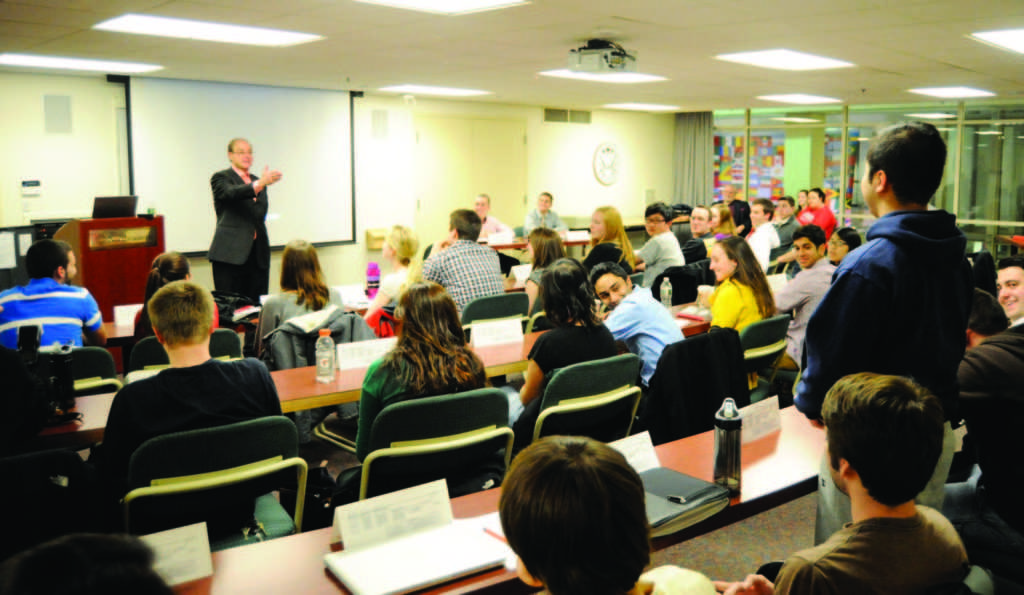Data shows NU administration rarely follows through on SGA referenda
President Joseph E. Aoun speaks at an SGA meeting in 2012.
September 19, 2019
Getting a referendum question on the annual Student Government Association ballot requires an immense amount of time and effort from its sponsors. Enacting referenda once they are passed is even harder.
Every year, Northeastern students vote on a maximum of five referenda questions alongside the Student Government Association, or SGA, direct elections. This past spring, the three referenda questions each garnered at least 1,000 more “Yes” votes than the Brown-Nobile slate drew.
According to SGA bylaws, referendum questions “shall be classified as a Sense of the Student Body, as a Call for the Northeastern Administration to Act, or as a Call for the Student Government Association to Act.”
The News obtained referenda questions and voting records dating back to 2015. Some questions, like one from 2015 regarding a gender resource center, an all-gender bathroom question from 2015 and a recycling bin question from 2016, have been enacted.
However, the administration has not acted on most of the questions passed between 2015 and 2019. Some questions appear to be successful at first glance, but oftentimes these successes were motivated or assisted by forces beyond the student body or the SGA.
For example, the 2016 referendum question seeking to ban plastic bags was successful at eliminating plastic bags from Outtakes, Rebecca’s, Cafe Crossing and The West End. But this move coincided with a city-wide ban signed into law by Boston Mayor Marty J. Walsh in late 2017.
The referendum question from 2015 that sought fair wages for dining hall employees seemingly achieved its goal in October 2017, when workers were given a raise after fighting with Northeastern over working conditions and wages for years prior. The change also came after workers’ threat to strike during the Clinton Global Initiative event, in which the Clintons themselves were scheduled to appear on campus.
Carl Meakin, a third-year environmental science and politics, philosophy and economics combined major and the director of policy at Northeastern’s chapter of the Roosevelt Institute, said he isn’t confident in SGA’s ability to follow through with passed referenda.
“I haven’t seen a referendum question that passed and something immediately came of it,” Meakin said.
Meakin was involved in crafting the 2018 referendum question that recommended compost be collected in every residence hall. Meakin said residence halls on other campuses have successfully instituted similar composting programs, but Northeastern had never latched onto the idea.
“We thought by showing student support through the referendum process that we would be able to move it forward,” Meakin said. “It never happened.”
A fourth-year biology major and president of the Husky Environmental Action Team, or HEAT, Wynne Gallogly’s experience with the referendum process mirrors Meakin’s. Inspired by policies at other colleges and universities, Gallogly said she helped put a referendum question on the 2017 ballot that called for a ban on plastic water bottle sales on campus.
“The referendum question is just kind of an acknowledgement that the student body wants what the question is asking. But the administration won’t automatically honor it,” Gallogly said.
Why have so many referenda failed to change Northeastern’s policies? In some cases, the university’s response to referendum questions “depends on the level of the question,” said third-year civil engineering major and SGA Elections Chair Maria Firan. “They’re not very easy to get done, which is why I kind of see Northeastern’s inability to have concrete change on some of those.”
Meakin said he doubts that the feasibility of the referenda accounts for the recent stall in progress. “I do think some of them may not be the most likely to happen, but even the fairly non-aggressive boiler plate ones don’t happen either, like the compost question,” Meakin said.
The transient structure of the university can be another hurdle. Students are around campus for at most five years, and often less when considering breaks and experiences abroad.
“You have a lot of turnover in these things. These things take a really long time to get done and the people that start them might not be the people that finish them,” Meakin said.
All other factors considered, students pointed to the administration as the greatest barrier to enacting their referenda.
Gallogly echoed this sentiment. “As HEAT and I have learned, the administration is going to do their own thing. They don’t really care what the students vote on. Have you ever heard Aoun ever talk about a referendum question?” Gallogly said.
Firan also sees university leadership as a barrier. “I kind of wish the administration would at least recognize or have some sort of input in saying, ‘Hey, we recognize this is what the student body voted for, we are aware of this, we are going to try to do something,’ rather than just kind of screaming into the abyss which I feel like is happening,” Firan said.
In the past, SGA has mostly been absent from action on referenda questions once they are passed, and Firan hopes to change this. “I hope that we can eventually establish a referendum committee that has a role of just keeping track of these referenda and speaking with sponsors and ensuring that administration is aware — that it’s not just gonna wait another year for new referenda to come around so they can ignore last year’s ones,” Firan said.
In the meantime, referendum sponsors can at least use the questions as a means of publicizing their clubs’ goals, as every student who votes in the elections views the referenda questions.
“It’s really surprising to see everything that’s going on and how there are so many clubs that are so passionate about these things that are happening at Northeastern that so many people don’t know about,” Firan said. “I think that’s the beauty of the referenda process: just bringing those things to light.”







